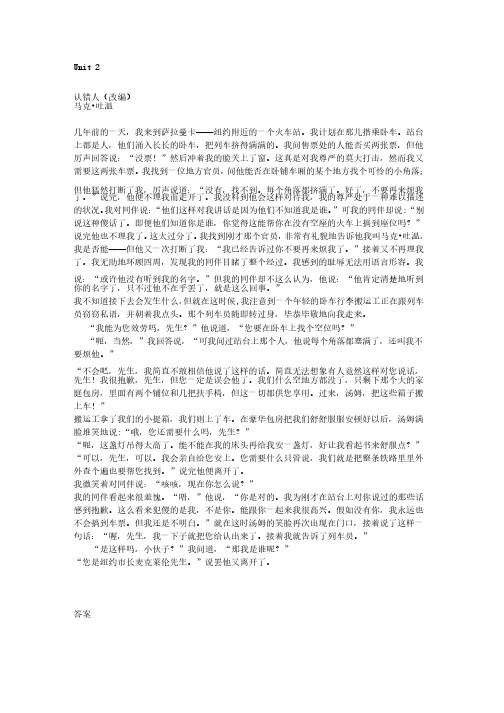21世纪大学实用英语综合教程2 unit2 课件
- 格式:ppt
- 大小:5.35 MB
- 文档页数:325



Unit 2认错人(改编)认错人(改编) 马克•吐温马克•吐温几年前的一天,我来到萨拉曼卡——纽约附近的一个火车站。
我计划在那儿搭乘卧车。
站台上都是人,他们涌入长长的卧车,把列车挤得满满的。
我问售票处的人能否买两张票,但他厉声回答说:“没票!”然后冲着我的脸关上了窗。
这真是对我尊严的莫大打击,然而我又需要这两张车票。
我找到一位地方官员,问他能否在卧铺车厢的某个地方找个可怜的小角落;但他猛然打断了我,厉声说道:“没有,找不到。
每个角落都挤满了。
好了,不要再来烦我了。
”说完,他便不理我而走开了。
我没料到他会这样对待我,我的尊严处于一种难以描述的状况。
我对同伴说:“他们这样对我讲话是因为他们不知道我是谁。
”可我的同伴却说:“别说这种傻话了。
即便他们知道你是谁,你觉得这能帮你在没有空座的火车上搞到座位吗?”说完他也不理我了。
这太过分了。
我找到刚才那个官员,非常有礼貌地告诉他我叫马克•吐温,我是否能——但他又一次打断了我:“我已经告诉过你不要再来烦我了。
”接着又不再理我了。
我无助地环顾四周,发现我的同伴目睹了整个经过。
我感到的耻辱无法用语言形容。
我说:“或许他没有听到我的名字。
”但我的同伴却不这么认为,他说:“他肯定清楚地听到你的名字了,只不过他不在乎罢了,就是这么回事。
”你的名字了,只不过他不在乎罢了,就是这么回事。
”我不知道接下去会发生什么,但就在这时候但就在这时候,,我注意到一个年轻的卧车行李搬运工正在跟列车员窃窃私语,并朝着我点头。
那个列车员随即转过身,毕恭毕敬地向我走来。
员窃窃私语,并朝着我点头。
那个列车员随即转过身,毕恭毕敬地向我走来。
“我能为您效劳吗,先生?”他说道,“您要在卧车上找个空位吗?”“我能为您效劳吗,先生?”他说道,“您要在卧车上找个空位吗?”“我能为您效劳吗,先生?”他说道,“您要在卧车上找个空位吗?”“呃,当然,”我回答说,“可我问过站台上那个人,他说每个角落都塞满了,还叫我不“呃,当然,”我回答说,“可我问过站台上那个人,他说每个角落都塞满了,还叫我不要烦他。


21世纪大学实用英语综合教程-第二册-Unit-2LT教案授课单元21世纪大学实用英语第二册第二单元本(章)节授课方式课堂讲授(√)实践课()教学时数 6授课要点本(章)节教学目标1. master the basic language and skills necessary to makeand respond to an apology;2. understand the main ideas of Text A, Text B and Text C;3. master the useful sentence structures and words andexpressions found in the exercises relevant to the firsttwo texts;教学重点和难点1. know how to use the structure of V + V-ing or + infinitive;2. know how to reply to an invitation;3. guess the meaning of unknown words in context.思考题或作业1. Have you ever been mistaken for someone else? Or do you know someone who has been mistaken for another person? Please share your story with your classmates.2. Now imagine you have the same name as the mayor of your city and look like him too. What might happen when you go to a hotel asking for a room and are told that the rooms are all booked?教学内容与组织安排1st period Listening and speaking2ndText Aperiod3rdText Bperiod4 thGrammar Reviewperiod5thPractical Writingperiod6thImprove Your Reading SkillsperiodTeaching procedures:First PeriodContent:Unit 2 listening and speakingStep 1 Lead-inIn the Listening and Speaking section, you will learn the basic language and skills necessary to make and respond to an apology;Step 2 Listening and Speaking1) The Language for Making and Responding to an ApologyA. have a warm-up activity by asking Ss what they say when they cause trouble to others or make mistakes;B. have the Ss listen to Exercise 1 (1-3 times) and fill in the blanks with the missing words;C. ask one S to read aloud the talk so Ss can check their completed answers;D. ask other Ss to form responses to the apologies in Exercise 2. trying to use the expression learned in Exercise 1.2) Making and Responding to an ApologyA.go through the new words in the 1st dialogue in Exercise 3;B. listen to the dialogue twice while filling in the missing words;C.ask Ss to answer the questions about the conversation by way of group discussion or the traditional teacher- student interaction;D.have them look for the language used to make and respond to an apology;E. Ss can role-play the dialogue;F. do the same with the second dialogueStep 3 Ask Ss to study the structures presented in Exercise 4, and create situations for dialogues in which Ss blame someone for his/her mistake or fault and expect them to make both apologies and excuses with the help of the language they have picked up in Exercise 1 and expressions from Exercise 4.Step 4 Listening PracticeA. Listen to the following people speaking and decide what they are talking about. (Each one will be given twice.)B Listen to the following five short dialogues and choose the appropriate answers.(Each one will be given twice.)C. Listen to the following short story twice. Listen carefully and decide whether the statements are true (T) or false (F) according to the story you have heard.D.Listen to the following talk and fill in the blanks with the missing words. (The talk is given twice.)E. Listen to the talk again and then answer the following questions orally.Answers to the listening practice5. C A D A B6. C A B D C7. T T F F T8. in a loud voice particularly interesting in the same room in curing them left alone a talk suffering from a delusion who are youStep 6 SummaryThere’re many ways of making an apology:—Excuse me for my interrupting you.—I’m really sorry for being late.—I’m terribly sorry to step on you.—I’ m awfully sor ry (that) I have forgetten your name.— I apologize for what I have said.—I’m afraid I seem to have forgetten your birthday.— I owe you an apology for the delay.—I’m sorry. I didn’t mean to hurt your felling.— It was really quite unintentional.— I hope you excuse me.There are also many ways of responding to an apology:—That’s (quite) all right.—These things happen; it can’t be helped.—I quite understand. Please don’t worry.— (Oh well.) Not to worry.—No problem. Let’s forget it.Step 7 Homework assignment1. Form a dialogue with your classmates.2. preview the new lesson.Second PeriodContent:Unit 2 Text AStep1 Lead-in1. Have you ever been mistaken for someone else? Or do you know someone who has been mistaken for another person? Please share your story with your classmates.2. Now imagine you have the same name as the mayor of your city and look like him too. What might happen when you go to a hotel asking for a room and are told that the rooms are all booked?Step 2 Ask Ss to read the following passage and see what happened toMark Twain when he tried to get a train ticket.Step 3 Introduce the Background InformationMark Twain (1835-1910)Mark Twain was the pen name of Samuel Langhorne Clemens, one of the major authors of American fiction. Twain is also considered the greatest humorist in American literature. Twain’s varied works include novels, travel narratives, short stories, sketches, and essays. His writings about the Mississippi River, such as The Adventures of Tom Sawyer, Life on the Mississippi, and Adventures of Huckleberry Finn, have been especially popular among modern readers. (From the 1998 World Book Encyclopedia)7-Eleven7-Eleven, Inc. is the world’s largest operator, franchiser and licensor of convenience stores with more than 24,000 units worldwide. Founded in Dallas, Texas in 1927 as an ice company, 7-Eleven pioneered the convenience store concept during its early years when its ice docks began selling milk, bread and eggs as a convenience to customers.The name 7-Eleven originated in 1946 when the stores were open from 7 a.m. until 11 p.m. Today, offering customers 24hour convenience, seven days a week is the cornerstone of 7-Eleven’s business. Approximately 5,800 7-Eleven and other convenience stores are operated and franchised in the United States and Canada.Step 4 Listen to the whole text and answer some questions about the text.Step 5 Deal with some languages points1) I was to take the sleeper train there: I planned to take the sleeper train there.我计划在那儿搭乘卧车。

21世纪大学实用英语综合教程(第二册)课文翻译及课后习题答案unit 2Unit 2The wrong person (adapted)Mark, Twain?One day a few years ago, I came to Salamanca, a railway station near New York・I plan to take the sleeper train thcrc. The platform is, they poured into the long sleeper, the train is crowded. I asked the man at the ticket office if he could buy two tickets, but he snapped: 〃no tickets.〃!〃And then closed the window to my face・ It was a real blow to my dignity, but I needed the two tickets again. I found a local official and asked him if he could find a poor corner somewhere in the sleeping car, but he snapped at me and snapped: 〃no, I can,t find it. 〃・Every corner is packed. Well, don,t bother me any more・〃With that, he ignored me and walked away. I had not expected him to treat me like this, and my dignity was in a state beyond dcscription. I said to my companion, "they talked to me like this because they didn,t know who I was・"But my companion said, 〃don't say things like that・ Even if they know who you arc, do you think it will help you get a scat on a train that doesn,t have an empty seat?" And he ignored me. This is away over the linc. I found the officer and politely told him my namc was Mark Twain. Could I - but he interrupted me again: ve told you not to bother me again."・〃Then he stopped talking to me.I looked helplessly around and found my companion witncssing the whole process・ The shame I felt could not be described in words・ I said, "maybe he didn't hear my name・〃・" But my companion didn't think so. He said, 〃he must have heard your name clearly, but he didn,t care,that's all. 〃I don,t know what will happen next, but at this time, I noticed a young porter of sleeping car whispering to the conductor, and nodding toward me. The conductor immediately turned around and walked reverent and respectful to me.,z What can I do for you, sir?" He said, 〃you need to find a place in the sleeper?""Well, of course, z,I replied, "but I asked that man on the platform, he said that every corner is full, also told me not to bother him・"〃No, sir, I can,t believe he said that・〃・I can,t imagine anyone talking to you like this, sir! T m sorry, sir, but you must have misunderstood him・ We don't have any room left・ There,s only the large family room with two berths and a few armchairs, but all of them are for you to enjoy. Come here, Tom・ Put these boxes on the bus!"The porter took our suitcase and we got on the bus・ After we had been comfortably settled in the deluxe room, Tom laughed and said, 〃0h, what else do you need, sir?"〃E T, the lamp is too high・〃・Can you fix me a lamp at my bedside so that I can read the book more comfortably?"Yes, sir, you can. 〃・I' 11 fix it for you personaily. What do you need to say, we are the whole railway and check a times to help you find・〃And he left・I smiled and said to his friend, "well, what do you say now?〃My companion looks ashamed・he said, "you're right・〃・r m sorry for what I said to you on the platform just now. So it seems stupid to me, not you. I'm glad to be with you. But for you, I wou 1 d never have gotten the ticket・ But I still don,t understand・〃Just then, Tom,s smiling face appeared again at the door, and then he said, "Oh, sir, I recognized you at once・〃・Then I told the conductor・"〃Is that so, young man?" "Who am I?〃I asked"〃You are Mr. Mcclellan, mayor of New York・"Then he left again.AnswerFive1.bother, bother2., companion3. , Shame4. , officials5., notice6. recognized7. vacant8. scene9. politely 10. describeSix1.,cut, short,2., at, their, disposal,3., at, the, same, time,, in.・・ Face5., turn, your, back, on,6. , a, couple, of,7. , turned. •・Inside out 8. Look aroundSeven"Must have seen the tickets for tonight" s play2., must, have, been, here, many, times3., may, have, gone, bad4.,may, not, have, received, the, presentEightThe "Nancy was glad to have quit her part-time job her before final exams. z/〃Aren t you ashamed to have eaten all the fruit in the basket?"The 〃We are really grateful to have received so much care during visits our here・〃"Henry was foolish to have trusted such a liar・"Nine〃The public that noticed since that official left local hisposition had been vacant for a couple of months・〃"Seeing the looking girl around helplessly the platform on the young porter asked politely if she needed any help.,zThe 〃I recognized your companion the minute he appeared at the door. He looked just as you had described・〃"We, didn, , t, bother, to, find, a, hotel, for, my, good, friend, US, to, stay, in, her, invited, house, and, put,, a, luxurious, disposa 1., car, at, our. 〃Turning While the professor was the suitcases inside out to his find glasses his wife was sitting comfortably in an armchair watching the whole scene・〃I turned my back on her because she expected me to treat her like a queen."Ten"Seeing a doctor as soon as possible"2.,working, for, another, hour3. , buying, a, new, car4.,going, to, the, cinema5.,having, been, to, New, YorkSix我辞职7o说它8o被认可9o花光了所有的钱10o我失去工作但愿保罗?莫纳汉我在一家7-11商店里已经工作了两年,自以为很善于处理我们经理所说的”与顾客的关系” To我坚信,一个友好的微笑和脱口而出的”先生”、”女士”和”谢谢”就足以让我应付任何可能岀现的情况,无论是安慰缺乏耐心或难缠的顾客,还是为找错零钱而道歉。
21世纪大学实用英语综合教程(第二册)___________________________________________________UNIT 1误会他头发蓬乱,衣着肮脏,口袋里只有35美分。
在马里兰州的巴尔的摩,他登上一辆公共汽车并径直走向了洗手间。
他想如果他躲在洗手间里,便可以不付钱就乘车去纽约。
但是坐在公共汽车后面的一位乘客看见了他。
她拍了拍她前面那位乘客的肩膀说:“洗手间里有个流浪汉。
告诉公共汽车司机。
”那位乘客轻轻地拍了一下坐在他前面的人,说道:“告诉公共汽车司机,洗手间里有个流浪汉。
这口信通过一个又一个的乘客传到了公共汽车的前边。
但在这一过程的某个环节,口信变了。
当它传到公共汽车司机那儿时,已经不是“洗手间里有个流浪汉”,而是“洗手间里有颗炸弹”。
司机马上在公路边停下车来并用无线电通知了警察。
当警察到达时,他们让乘客下车并且远离汽车。
然后他们关闭了那条公路。
那很快就造成了15英里长的交通堵塞。
警察在警犬的帮助下,在公共汽车上搜查了两个小时。
当然,他们没有发现什么炸弹。
两个发音相似的英语单词给一个想从洛杉矶飞往加利福尼亚州奥克兰的人也造成了麻烦。
他的问题始于洛杉矶机场。
他以为听到广播中宣布了他的航班,所以他走向登机门,出示了机票并登上了飞机。
起飞20分钟后,这人开始担心起来。
奥克兰在洛杉矶的北边,但是飞机似乎正在向西飞,而当他向窗外望去时,他所能看到的全是大海。
“这架飞机是去奥克兰吗?”他问航班服务员。
航班服务员倒抽了一口冷气,“不,”她说。
“我们去奥克兰——新西兰的奥克兰。
”因为有这么多英文单词发音相似,讲英语者之间的误会并不罕见。
并非所有的误会都会导致公路关闭或乘客飞错大陆。
大多数误会远没有这么严重。
每天讲英语的人会相互问这样的问题:“你是说七十还是十七?”“你是说你能来还是不能来?”发音相似的单词对把英语作为第二语言的人来说,特别容易让人混淆。
一天早晨,一位生活在美国的韩国妇女到上班地点时,她的老板问她:“你拿到盘子了吗?”“没有……”她回答说,心里却在纳闷,不知道他到底是什么意思。